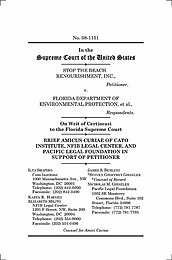Stop the Beach Renourishment, Inc. v. Florida Department of Environmental Protection
Learn more about Cato’s Amicus Briefs Program.
Seeking to restore beaches damaged by hurricanes, the Florida Department of Environmental Protection began dredging sand from the Gulf of Mexico ocean floor and transporting it to Florida’s gulf coast. The expanded area of the beach became state property, depriving beachfront landowners of their littoral rights. In reviewing the landowners’ lawsuit against the state, the Florida Supreme Court departed from long-established state law principles protecting littoral property rights and held that littoral rights are an ancillary concept subsumed by the right of access. In so doing, the court discarded 100 years of property law and rewrote the definition of property. The U.S. Supreme Court agreed to review the case. The Court has never formally addressed whether state court rulings eliminating formerly established property rights can effect a taking, or violate an owner’s due process rights, under the Fifth and Fourteenth Amendments to the U.S. Constitution. Cato joined the National Federation of Independent Business Small Business Legal Center and the Pacific Legal Foundation on a brief supporting the landowners. We argue that the realities of modern property law, including the authority of state courts to define background principles of property law, necessitate that property owners be protected, via the judicial takings doctrine, against state court decisions that abrogate constitutional rights. Without such protection, states are free to effect takings of private property without compensation by having their judiciaries redefine property rights and thus bypass long-established constitutional protections.

This work is licensed under a Creative Commons Attribution-NonCommercial-ShareAlike 4.0 International License.

